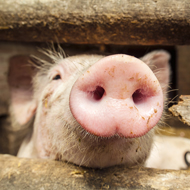MCR-1 thought to be 'circulating' in the US

MCR-1 was first discovered in multiple samples from pigs, pork and humans in China late last year.(stock photo)
US health officials have found bacteria that is resistant to the 'last resort' antibiotic, colistin, in a second pig sample. A similar discovery was made last month in a human patient.
Experts say there is growing evidence that the MCR-1 gene - which allows bacteria to become resistant to colistin - is circulating in the US. It is feared the gene could spread to bacteria that can only be treated with colistin, creating a superbug that is immune to all available antibiotics.
The latest discovery was made during testing at a slaughterhouse in Illinois, according to the Washington Post. E.coli bacteria carrying the gene was identified in a pig intestine, a spokeswoman for the US Department of Agriculture is reported to have said.
This is the second pig sample in the US found to contain resistant bacteria. A different strain of E.coli carrying MCR-1 was discovered in the intestines of a pig from another state last month.
For the first time, MCR-1 was also detected in a human patient in the US. E.coli bacteria carrying the gene was identified in a urine sample from the 49-year-old Pennsylvania resident.
Patrick McGann from the US Department of Defense, is quoted by the Washington Post as saying: "Mounting evidence suggests the MCR-1 gene is circulating within the United States. Our sample was in a woman with no recent travel history, the pig samples are from slaughterhouses in the USA, and [the] strains are all different."
Scientists across the globe have been looking for the gene since it was first discovered in multiple samples from pigs, pork and humans in China late last year.
Colistin is one of the last resort drugs, used to treat bacteria that is resistant to other antibiotics. The concern is that MCR-1 exists on a plasmid - a small piece of DNA - that can move from one bacterium to another, spreading antibiotic resistance. The gene has since been found in Europe and Canada, as well as the US.



 RCVS Knowledge has welcomed Professor Peter Cockcroft as editor-in-chief for Veterinary Evidence.
RCVS Knowledge has welcomed Professor Peter Cockcroft as editor-in-chief for Veterinary Evidence.